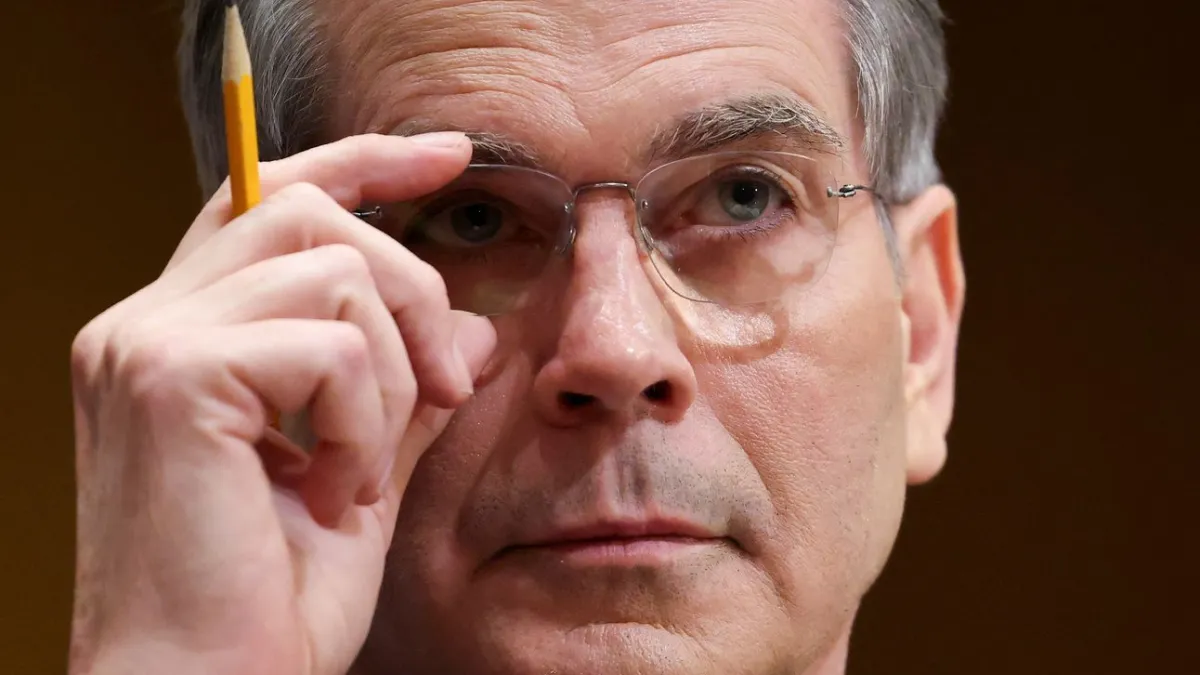
Good evening. It was another busy day of confirmation hearings on Capitol Hill. Here's what we're watching.
Trump's Treasury Pick Warns of 'Economic Calamity' if Tax Cuts Expire
At his confirmation hearing before the Senate Finance Committee on Thursday, Treasury Secretary nominee Scott Bessent defended President-elect Donald Trump’s economic proposals for tax cuts and higher tariffs while deriding federal spending that he described as “out of control.”
Bessent, a wealthy financier who rose to prominence investing in currencies at Soros Fund Management, told lawmakers that the U.S. could face an economic crisis if lawmakers fail to extend the 2017 Tax Cuts and Jobs Act, key provisions of which are set to expire at the end of 2025.
“This is the single most important economic issue of the day — this is pass/fail,” Bessent said. “If we do not fix these tax cuts, if we do not renew and extend, we will be facing an economic calamity. And as always with financial instability, that falls on the middle-class people.”
Bessent also spoke in favor of significant spending cuts to cover the cost of lost revenues from extending the tax cuts. “We do not have a revenue problem in the United States of America,” he said. “We have a spending problem. This is one of the things that got me out from behind my desk and my quiet life in this campaign, was the thought that this spending is out of control.”
The reward for enacting the right mix of policies could be enormous, he suggested. “I believe that President Trump has a generational opportunity to unleash a new economic golden age that will create more jobs, wealth, and prosperity for all Americans,” he said in his introductory remarks.
Debt ceiling: Bessent sought to reassure lawmakers that if he is confirmed, the U.S. will not default on its debt obligations, saying he assumes there would be an “enormous cost” involved in a default. He also said he was open to eliminating the debt ceiling, the legal limit on U.S. debt issuance. “Once President Trump takes office, and if I’m confirmed, if he wants to eliminate the debt limit, I will work with him and you on that,” he told Democratic Sen. Elizabeth Warren.
At the same time, Bessent took note of the exceptionally high level of the national debt. “We have never seen this before when it is not a recession or not a war,” he said. “Treasury, along with full government and Congress, has used its borrowing capacity to save the Union, to save the world and to save the American people and what we currently have now, we would be hard-pressed to do same.”
Tariffs and inflation: Bessent echoed Trump’s claim that higher tariffs on imports could be a significant “revenue raiser” that would boost the federal budget, as well as an important negotiating tool. He also pushed back against the notion that tariffs could create inflationary pressure as importers raise prices to cover their rising costs, saying that a stronger dollar would help offset any increased costs, shielding consumers from the full impact of any tariff hikes. More broadly, he said he didn’t think any of the policies Trump has proposed would be inflationary. Many economists have said otherwise.
No tax increases on the rich — or anyone else: Asked by Democratic Sen. Raphael Warnock if he agreed that it would be a good idea to end the 2017 tax cuts for those making more than $400,000 to help close the deficit and reduce the national debt, Bessent said no, because doing so would “capture an inordinate amount of small businesspeople” who earn between $400,000 and $1 million per year.
Warnock raised the threshold, asking if it would be a good idea to allow the tax cuts to expire for those earning $1 million and up. Bessent gave the same answer, saying it would hit small business owners who use pass-throughs, referring to a kind of tax structure frequently used by sole proprietors and partnerships.
Bessent also rejected the idea of letting the tax cuts expire for high earners at the $10 million threshold, saying, “it’s important that we put in incentive for them to invest.” Asked about $1 billion in individual earnings, Bessent said he would not support allowing the tax cuts to expire for those “job creators.”
Summing up, Warnock said, “So there’s no income level for which you would support raising taxes? Is that fair?” Bessent agreed, saying, “There’s no income level that I don’t think we should continue the TCJA as it was.”
Sanctions: Bessent said he would support more aggressive sanctions against Russia to pressure that nation to end its war in Ukraine. “If any officials in the Russian Federation are watching this confirmation hearing, they should know that if I’m confirmed, and if President Trump requests as part of his strategy to end the Ukraine war, that I will be 100% on board for taking sanctions up, especially on the Russian oil majors, to levels that would bring the Russian Federation to the table,” he said.
IRS: As Treasury secretary, Bessent would oversee the IRS. He said he would allow the Direct File program, which provides free filing for some taxpayers, to continue, at least for the current tax season, which begins on January 27. For-profit tax preparation companies have called for an end to the program, a cause taken up by some Republicans in Congress, but Bessent said he wanted to study the issue before making a decision.
House GOP Leaders Ask Trump to Hold Off on Some Executive Orders: Report
President-elect Donald Trump has been preparing scores of executive orders to be signed on his first day in office — around 100 in total, he told Republican senators recently. But House Republicans leaders have now asked the incoming administration to hold off on some orders reversing Biden policies so that they instead can repeal those policies in their planned budget reconciliation bill — and capture the expected savings to help offset the costs of their legislation.
Punchbowl News reports that House Republicans, concerned about how the Congressional Budget Office might score the plan they devise, have asked the incoming team to not push through executive orders to roll back President Joe Biden’s student debt forgiveness program, fuel economy standards for cars and light trucks and incentives for electric vehicles.
“This behind-the-scenes effort is part of an overall hunt by senior House Republicans for additional budget savings to help offset their reconciliation package, which includes plans for tax cuts and border funding,” Punchbowl’s Jake Sherman, Melanie Zanona and Laura Weiss write. “Many Hill Republicans want to go big, like a long-term or even permanent extension of the Trump tax cuts in the reconciliation package.”
Many Billions in Pandemic Unemployment Fraud Will Probably Go Unpunished
Time is running out for officials to bring charges in cases of unemployment-insurance fraud related to the government’s expanded pandemic-era benefits, The Wall Street Journal’s Paul Kiernan reports. With the five-year federal statute of limitations approaching, Kiernan says, “most instances of pandemic unemployment fraud, which the Government Accountability Office estimates at $100 billion to $135 billion, will likely go unpunished.”
The Trump-era Cares Act, from March 2020, was a bipartisan $2.2 trillion stimulus package that provided hundreds of billions of dollars in increased and expanded unemployment benefits at a time when lawmakers were more concerned about the economic threat of the new pandemic, as millions of workers suddenly lost their jobs, than about the potential for fraud, waste or abuse.
“The law became an unprecedented opportunity for criminals armed with the personal information of millions of Americans and sophisticated tools. All told, hundreds of billions of taxpayer dollars are believed to have been stolen from unemployment insurance, the Paycheck Protection Program and the Economic Injury Disaster Loan Program for small businesses,” Kiernan writes. He adds that the pandemic may have led to a structural increase in unemployment insurance fraud, which continues at a higher level than before Covid.
Prosecutors would like Congress to extend the statute of limitations to 10 years, but a bipartisan bill to do so died at the end of the last Congress. As of now, Kiernan reports, “the government is on track to recover as little as 0.8% of the unemployment benefits paid out to swindlers.”
Read more at The Wall Street Journal.
Photo of the Day
The Trump transition team today released the official portraits of President-elect Donald Trump and Vice President-elect JD Vance — and boasted that the new pictures “go hard.” The distinctively lit Trump one, below, is reminiscent of his mug shot in the Georgia election interference case — an image Trump plastered on a wide range of merchandise. (You can find the Vance picture here.) As for whether the new presidential portrait “goes hard,” we’ll let you decide.
Fiscal News Roundup
- Confirmation Hearings Day 3 Highlights: Doug Burgum, Scott Bessent and Other Cabinet Picks Face Senate Questions – NBC News
- Treasury Secretary Pick Scott Bessent Says Trump Could Bring 'New Economic Golden Age' – Wall Street Journal
- Many Americans Doubt Trump Will Be Able to Lower Prices in His First Year: Poll – Associated Press
- Trump Floats Adding Los Angeles Aid to Reconciliation Bill – The Hill
- Trump Tasks Congressman With Writing Executive Order He Could Issue to Halt Offshore Wind – Associated Press
- Ukraine Hawk Removed From House Intelligence Role, Reportedly at Trump's Request – Washington Post
- Mike Johnson Faces Bipartisan Shock, Fury for Ousting Intel Chair – Axios
- Path Forward on Health Care Package Causing Heartburn – Politico
- Energy and Commerce GOP Meets on Reconciliation Plans – Politico
- Biden Admin Announces Last Round of Student Debt Relief – The Hill
- DeSantis Picks Florida's Attorney General to Replace Rubio – New York Times
- The House Democrat Who Wants Trump to Go Big on Tariffs – Washington Post
- Steady Global Economic Growth Leaves Poorest Nations Behind, World Bank Says – Washington Post
- EV, Hybrid Sales Reached a Record 20% of U.S. Vehicle Sales in 2024 – NBC News
- Biden Warns of Oligarchy and Tech Industrial Complex in Farewell Address – Wall Street Journal
Views and Analysis
- The GOP Rivalry That Could Spell Big Trouble for Trump – Rachael Bade, Politico
- Why Salty Blue-State House Republicans Are Vital to Saving Trump's Tax Cuts – Jim Geraghty, Washington Post
- Treasury Pick Bessent Should Know Hope Isn't a Strategy – Jonathan Levin, Bloomberg
- Biden Warns the US Risks Becoming an 'Oligarchy.' What Does the Term Mean? – Josh Boak, Associated Press
- Trump Offered a Bountiful Batch of Campaign Promises That Come Due on Day 1 – Calvin Woodward, Associated Press
- Trump's Tariffs May Not Do What He Thinks – Matthew C. Klein, Politico
- The Inflation Genie Is Moving to the White House – Conor Sen, Bloomberg
- The Fed Can't Pin Inflation on Trump – Kevin Warsh, Wall Street Journal
- Greenland Does Not Want to Be Part of the US, but We Are Open for Business – Naaja H. Nathanielsen, Washinton Post
